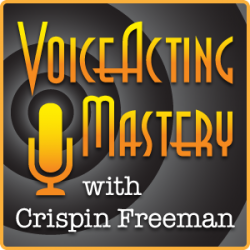VAM 086 | Interview with Scott Menville, Part 3

VAM 086 | Interview with Scott Menville, Part 3
Welcome to episode 85 of the Voice Acting Mastery podcast with yours truly, Crispin Freeman!
As always, you can listen to the podcast using the player above, or download the mp3 using the link at the bottom of this blog post. The podcast is also available via the iTunes Store online. Just follow this link to view the podcast in iTunes:
http://www.voiceactingmastery.com/podcast
This is the third and final part of my interview with the wonderfully talented Scott Menville.
Scott is probably best known for his portrayal of Robin in the animated series Teen Titans and Teen Titans Go!, but Scott has been working both as a voice actor and an on-camera actor since he was 11 years old! Scott brings a wealth of experience to our discussion as well as an amazingly positive mindset, and I’m thrilled to have him on the podcast.
In this episode, Scott and I wrap up our discussion by talking about the times in voice acting when things didn’t seem to go our way. However, in the midst of such adversity, Scott and I both learned powerful lessons. Often you learn and grow more from your “so called” failures than your successes. After all, a failure is just an opportunity to learn something new on the way to your future success.
At the end of our interview, Scott was kind enough to share his advice for aspiring voice actors. His insights are useful and encouraging, and I’m sure you’ll enjoy them.
In the next episode, I’ll continue answering more questions from my listeners. For those of you who don’t know, I provide a call-in number where any of you can leave me a voicemail with your own thoughts, thank you’s or questions. Then, when it’s time for me to do a Q&A episode, I choose the most relevant questions and answer them for you here on the podcast. The call-in number is 323-696-2655. Please remember to state your first name and what city in the world you’re calling from before leaving your message. Thanks again for listening, and I’ll see you in the next episode!
Download Voice Acting Mastery Episode #86 Here (MP3)

Great.
Thanks to you and Scott for your time and wisdom.
You’re very welcome!
robins voice is pretty hip yet he looks nothing like the character
Yup. That’s the nature of voice acting. We often look very different from the characters we portray.
Lovely parting words from Scott! It was great to hear from him in this interview. Looking forward to the next one~!
Thanks! I’m looking forward to the next one as well!
Hi Crispin,
Thanks for the podcast, it is full of very useful and helpful information, I enjoy listening to it.
I do have a question, things like the portabooth, or a homemade version of those, and reflection filters, do they colour the sound that gets picked up by the microphone?
I’m glad you’re enjoying the podcast.
The portabooth and other types of baffle boxes are specifically designed to try and minimize the reverb or echo in a room. They’re not designed to “color” the sound of the microphone, their designed to minimize audio reflections in a room that has not been treated acoustically. If you are recording in an acoustically treated sound booth, you won’t need a portabooth or baffle box. However, if you are recording in an untreated room, a portabooth can offer you some acoustical treatment. It’s not as effective as a room that has been appropriately treated with acoustical foam and diffusers, but it’s far better than nothing.
Hope that answers you question.
I loved how you went into even more detail into how voice acting is like being a chef. I also loved how Scott was incredibly supportive to up and coming voice actors and shared his experiences with us. I’m looking forward to the next podcast and thanks again.
You’re very welcome. I’m glad you’re enjoying the podcast!
Voice acting is like being a chef, yet there is no recipe. I’m never going to figure out how many eggs I’ll need… ah well.
I’m really glad to have heard Scott’s interview. Two great voices I hear all the time when I pop in my Tekkonkinkreet dvd.
You are correct. There is no recipe for making good art, just as their is no recipe for how to make a great painting. However, there are principles that you can use to help improve your artistry just as there are drawing principles like anatomy, perspective and color theory that can help improve your painting. You have to experiment yourself with those principles to see what works for you. If the interviews on this podcast show anything, it’s that everyone has a different path.
Glad you enjoyed the interview.
To say that I have been enjoying the podcast isn’t necessary, to say that I have been learning a lot from it is. I can not begin to thank you enough for the information that you so willingly share with us. The way in which you constantly broaden the meaning behind the phrase ” love the art in yourself” has led me to envision “art” like a great and vast ocean with both tributaries and runoffs. When I create art, I form a tributary into the larger pool of art in existence rather than simply running off from it. Thank you for being such a force for inspiration to me.
Thank you for your kind words! I’m so glad you’re finding the podcast both enjoyable and educational.
Your description of art as a vast ocean reminds me of J.R.R. Tolkien’s description of the tree of storytelling, where every story is a leaf or a branch on a larger unified tree. He discusses it in his short story, “Leaf by Niggle”. Very nice.
All the best to you.